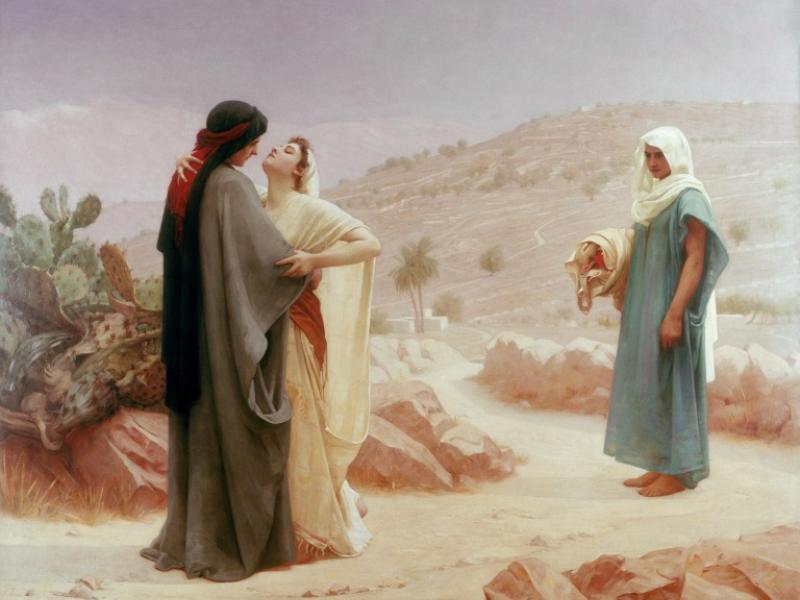
Throughout November we’re taking an in-depth look at Ruth, the little book that helped pave the way for God’s Messiah to come into the world.
In the Bible’s library of 66 books, Ruth is distinctive.
Along with Esther, it’s one of only two books named for a female. No other book reserves the starring roles for two women (Ruth and Naomi). Unlike anything else in the Old or New Testaments, more than half the book is in the form of conversation.
The first dialogue appears in Ruth 1:6-18. It’s definitely one to remember.
Naomi has heard that the Lord “has come to the aid of his people” back in Israel. The famine is over. She resolves to leave Moab and return home. As she sets out, however, she decides to have a DTR – a “define the relationship” talk – with her two widowed daughters-in-law.
Naomi tells Ruth and Orpah that it’s time to get real. “Then Naomi said to her two daughters-in-law, ‘Go back, each of you, to your mother’s home. May the Lord show kindness to you, as you have shown to your dead and to me. May the Lord grant that each of you will find rest in the home of another husband.’ Then she kissed them and they wept aloud” (1:8-10)
Ruth and Orpah push back. “We will go back with you to your people.” This is a beautiful and unexpected expression of commitment.
So Naomi pulls out the big guns. Essentially she says, “Don’t waste your lives by getting stuck with an old loser like me. I am a rock heading to the bottom of the ocean. You need husbands and I can never provide another mate for you.” Her clinching argument comes in verse 13: “The Lord’s hand has gone out against me!”
Naomi is being entirely logical. Her life is a disaster, so she concludes God must have it in for her. Ruth and Orpah would be fools to throw in their lots with her. She has no husband, no sons, no land, no food, no bank account, and no future. A normal life back in Moab would be overwhelmingly more sensible than following her into uncertainty.
Suddenly something clicks inside Orpah. Verse 14 tells us, “At this they wept again. Then Orpah kissed her mother-in-law good-bye.”
Years ago I was blessed to hear a sermon with a title I have never forgotten: Orpah the Sensible. This young woman appears to be an honorable person. The text gives us no reason to heap blame on her. Orpah is not a risk-taker. She calculates the likely outcome of continued loyalty to Naomi and says to herself, “The sensible thing is for me to exit this relationship and go create a future for myself.” So off she goes.
But then we come to the rest of verse 14: “But Ruth clung to [Naomi].” The contrast is stunning. “’Look,’ says Naomi, ‘your sister-in-law is going back to her people and her gods. Go back with her.’”
Many Bible readers, Jews and Christians alike, have concluded that the next two verses, Ruth 1:16-17, are among the most tender in all of Scripture:
“But Ruth replied, ‘Don’t urge me to leave you or to turn back from you. Where you go I will go, and where you stay I will stay. Your people will be my people and your God my God. Where you die I will die, and there I will be buried. May the Lord deal with me, be it ever so severely, if anything but death separates you and me.’ When Naomi realized that Ruth was determined to go with her, she stopped urging her.”
Even though this statement of commitment in its original context bridges two generations of widowed women, it has been spoken at numerous weddings over the centuries, and rightfully so.
Ruth sees the same data that Orpah sees. She also has accurately assessed her situation. But what Ruth has come to know of the God of Israel compels her to be lavishly courageous. She will leave behind everything she has ever known – her homeland, her family of origin, and the gods she used to believe in – and begin a new life.
As one commentator has written, “In a world where life depended on men, she committed herself to an old woman. There was no more radical decision in Israel.”
There will always be times when, from the world’s perspective, it will seem sensible to walk away from our commitments – from a marriage that no longer thrills us, from childrearing that overwhelms us, from taking care of older parents that depletes us. Where can strength be found? The blessing of God is in the resolve to be promise-keepers – trusting that God is able to provide more than we could ever ask or imagine.
Naomi and Orpah were being sensible and logical. And logic is a good gift from God. But it is highly overrated as a means of charting our way through life.
A logical approach to reality takes into account everything that we see, that we think, and that we feel. But in practice, human logic almost always excludes God. We come up with every scenario we can imagine and try to account for every possibility. God, however, operates far beyond the boundaries of our imagination.
We cannot try to be in control and trust God at the same time.
What is the simplest, most profound definition of faith? Faith is leaving space for God to work. We leave room for a sovereign God to do what we don’t even have the wisdom to ask him to do.
That means that hope is a choice. We choose to believe that life isn’t over, even when our circumstances scream that all is lost.
Ruth made the bold choice to put her hope in God.
That’s why her story is still being told today.
